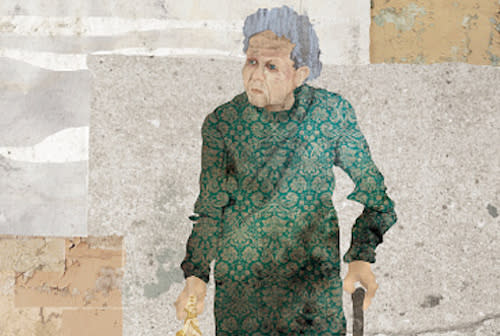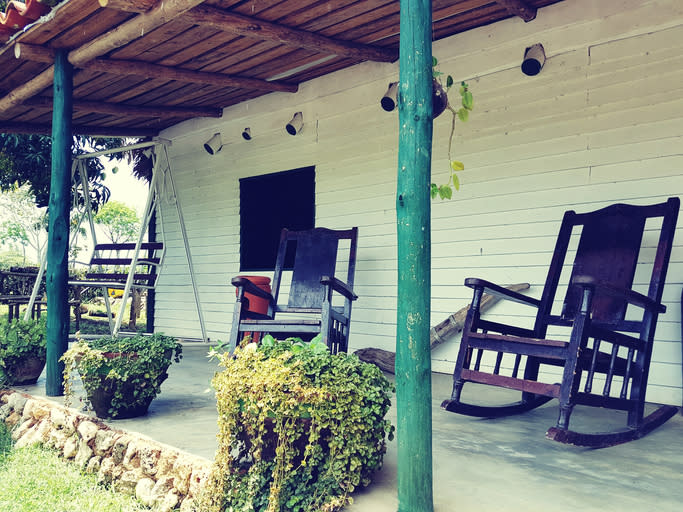How a bold 95-year-old woman became my unexpected best friend

September 17th is National Women’s Friendship Day.
She looked at me, deadpan, and said “You’re an old heifer.”
I gasped, then burst out laughing. So did she, head tilted back, soft wrinkles crinkling deep and her wide smile tilted toward the Southern sun, illuminating her one remaining tooth.
There we were, the ultimate odd couple, calling each other cows on the front porch of an ancient home in Memphis, Tennessee.
I was 25. She was 95. And we were best friends.
I had recently moved to Memphis from New York City. And, not long after arriving in the land of BBQ and blues, I completely fell apart. The drastic change of pace and lifestyle sent me into a deep depression. It was her, an old — really old — stranger who pulled me out.
Back in New York, my husband, Kyle, and I were surviving just fine, sort of. We were getting by in that broke-and-pretending-we-weren’t kind of way that the city sucks you into. A friend called and let Kyle know about a job opening in Memphis. “Where is that?” I asked, my mind completely consumed with subway routes. Somewhere warmer, I figured. He applied, interviewed, they flew us down to visit, and we were captivated by the city’s gritty charm. It was instant love.
That, and Google told me Memphis was the fourth cheapest city to live in America. So we packed up, said goodbye to our beyond overpriced 400-square foot brownstone apartment, and hit the road.
New York was always a struggle. Any task required walking, hauling, hoofing, sludging, getting on a train, fighting for survival. Memphis was just…easy. The city was old, rundown, and slow moving — a time warp to a different era, almost.
The downtown Memphis buildings were beautifully crumbling and covered in chipped paint, the sidewalks cracked and uneven. We moved into the bottom floor of a historic dusty mansion converted into apartments. We had a backyard, and didn’t even know what to do with it.
There was a sense of peace blanketing just about everything — except me.
After a few weeks of living in this strange new place, my body — no longer inflated by the stress and adrenaline needed to simply survive in Manhattan — collapsed inward. My brain tried to adjust to the new city’s stillness, to find itself right side up again, and went absolutely bat-shit crazy in the process.
Depression was something I had struggled with before, and I was frustrated to see it return — especially with such intensity. I fell into my new norm of nights spent weeping loudly on our dirty wood floor, trying to find breath and slivers of strength to make it to tomorrow. In the morning, my main goal was just to make it to the coffee pot. Repeat. Repeat again.
Then, I met Edna.
I had joined a co-working space to get out of the house, and my new commute involved biking seven minutes in the fresh air as I blared Bob Marley on my phone, trying to cocoon myself within a semblance of the happiness I desperately craved. Serotonin, where art thou?
I quickly noticed that, in Memphis, everyone waves and says hello if you pass them on the street. It is a town where porch-sitting still happens, as if it was a sport.
I first saw her, rocking on her porch, waving at anyone who passed by. Every day, I biked past her on my way into the office, on my way home and back for lunch, and on my way home at the end of the day. She’d be out on her porch early, and stayed late into the evening when the fireflies blinked.
She always wore the same outfit: a bright salmon t-shirt, gray sweatpants, and a neat straw hat covering her erratic wisps of white hair, hands folded gently on her soft stomach. She rocked back and forth, back and forth, a look of contentment on her face.
Four times a day, I saw her. I’d do the Memphis wave and nod, and she’d reciprocate. She was always alone, and I couldn’t help but wonder about her. Plus, we waved to each other so many times by now, it began to feel weird that I hadn’t stopped by to introduce myself.
So, one evening, I pulled my bike into her driveway, worn and dotted with weeds, and said, “Hello.”
“Sit down,” she demanded, and pointed to the open rocking chair next to her, one I had never seen another soul sit in. I was a bit nervous, but she seemed nice. Plus, I figured that if she tried to murder me, I could just push her over and run away. So I sat. Up close, I could see every line on her pale skin. Her blue eyes were bright and kind, and there was that one tooth, fighting hard for its right to survive.
“My name is Edna, what’s yours?” she asked, getting straight to the point.
“Katie.”
“Katie. I am 95 years old. 95! Damn, I am old,” she said with a smirk.
She gazed back out onto her neighborhood street.
Edna wasted no time filling me in on all the details of her life, like we were new and old friends all at once. She told me how she was the second eldest of eight children, how she grew up in a trailer in a small Smoky Mountain town where, if you misbehaved, the residents would throw you off a cliff…literally. Her mom died young, and her dad was abusive, so when she turned 15, she decided she’d had enough.
“I told my Dad I was leaving, and never coming back. He said I wouldn’t make it, but I left anyway,” she said. “I borrowed $5 from the local preacher, got on a bus to Memphis, and never returned.”
She rocked in her chair, neither her voice or face showing any signs of regret.
Edna continued her story. She got to Memphis, began working at a dry cleaners, and moved into a small apartment. She eventually married, but her husband died suddenly in his 20s. She never remarried, or even dated.
“I never wanted to,” she told me. “A death like that can still make you ache after all this time,” she said, her eyes glazing over with grief seemingly as fresh as it was nearly 70 years ago. “Plus, what would I do with some ‘ole man? They need something from you all day long, then they need something from you all night long too” she said, cackling.
“I began to work double shifts in a factory to support myself,” she said. “I never had much, but I had enough.”
I asked Edna if she had anyone, any family nearby. She said she had her neighbor; that was it. Everyday for the past decade he has come by to take care of her. He cuts her hair and nails, helps her pay bills, and prepares her meals — just because. Their only relation to each other is that they live on the same street.
“Everyone’s dead except for me, but at least I have my ‘ole neighbor,” she explained. “I couldn’t make it without him. I am 95. Life isn’t easy and it never was. But I always just do the best I can, every day.”
She looked at me, her face reflecting earned sorrow and strength.
“That is all you can do. Take it one day at a time, and just do the best you can.”
***
She repeated that same sentence to me the next day when I stopped by, and again the next day, and the next day, and the next. It’s a reminder that we both need to hear: Take it one day at a time, and just do the best you can.
“I might give out, but I won’t give up,” she would say. “I want to see what happens to me tomorrow!”
She laughed, her hunched shoulders shaking in joy. “Hey, watch me do my exercises,” she said, and pushed herself up from her chair and shook her hips around like she had a bug in her underwear.
On a regular Tuesday afternoon, she looked at me and said, “You know what? You are my best friend, and you are my family.”
She didn’t really realize that, like her, I was nearly all alone in Memphis. I spoke to her far more than anyone else. She didn’t realize how much I actually needed her, too.
“Yes, absolutely. We are family. We are best friends,” I said, and went to the fridge to get her another bottle of vanilla Ensure.
***
I continue to stop over daily, especially in the evenings. Kyle works late, and going home to a lonely old house when I’m exhausted from a day of work and battling depression is a recipe for disaster. But sitting on the breezy porch with Edna — watching lightning bugs fly and Memphis leaves change colors, listening to the same stories and same strong mantras — seems to have some sort of medicinal power.
Together, in our matching rocking chairs with decades between us, we take life one day at a time. We just do the best we can.



